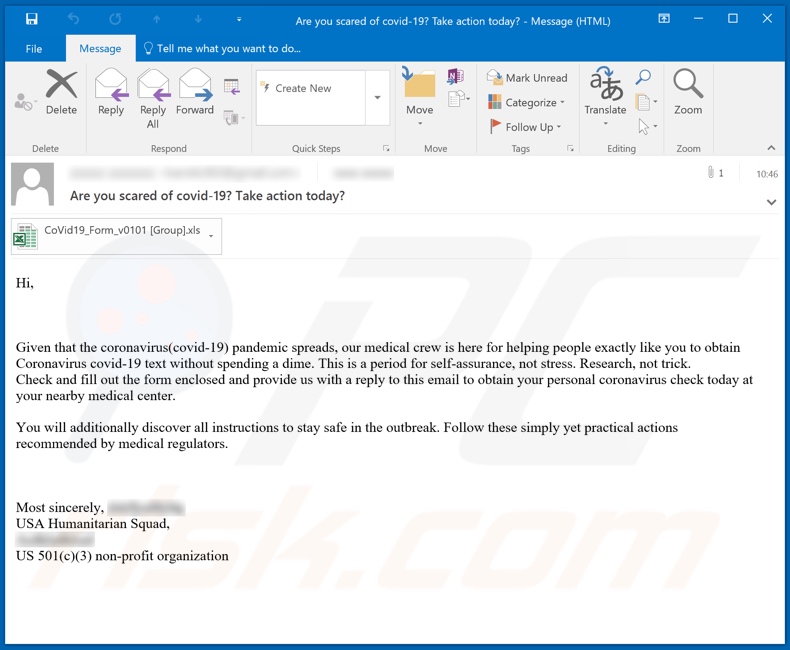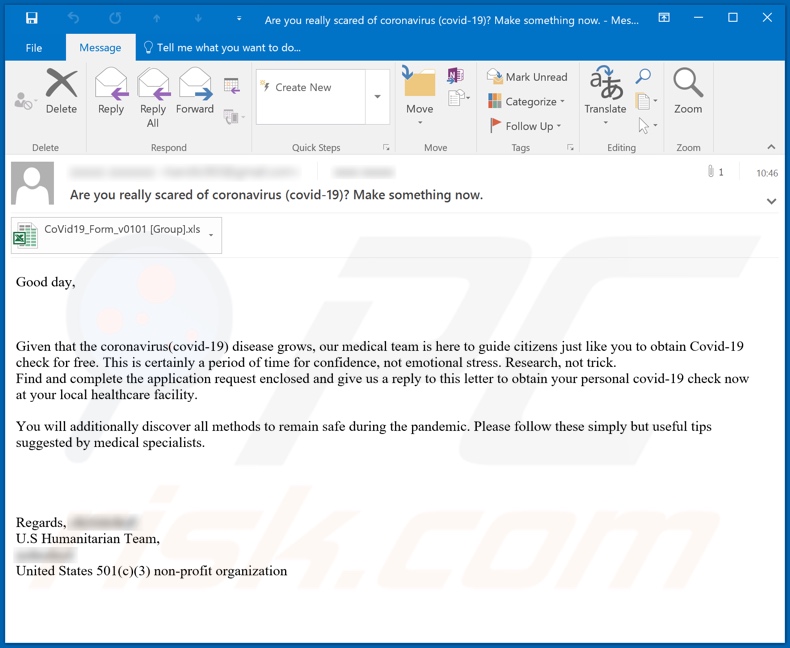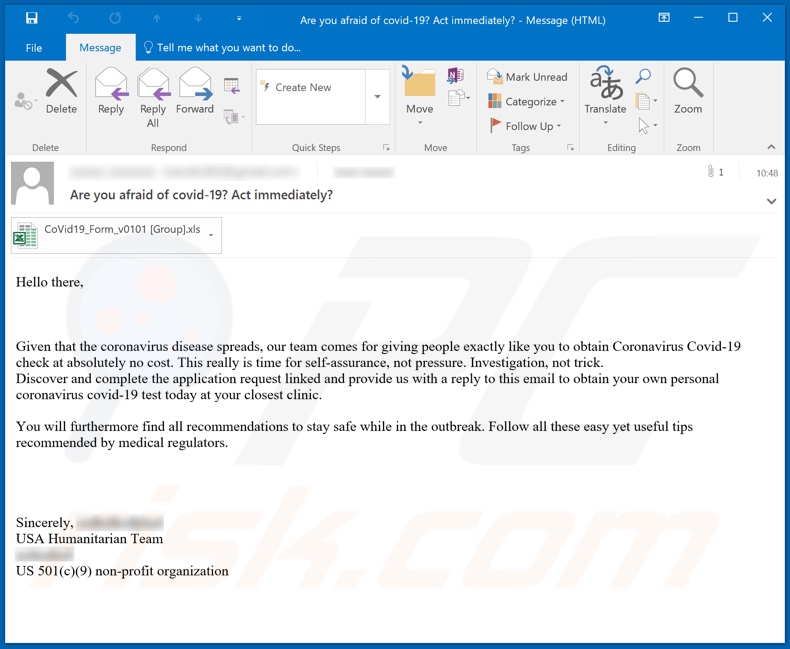Avoid malware infections from emails offering free COVID-19 tests
Phishing/ScamAlso Known As: COVID-19 Test spam
Get free scan and check if your device is infected.
Remove it nowTo use full-featured product, you have to purchase a license for Combo Cleaner. Seven days free trial available. Combo Cleaner is owned and operated by RCS LT, the parent company of PCRisk.com.
What is the "COVID-19 test" email?
"COVID-19 test" is yet another Coronavirus/COVID-19-themed spam email campaign. There are several variants of these deceptive emails, however, the common thread is that they all offer free coronavirus testing to recipients.
The messages claim that the attached files are forms/applications, however, the Excel spreadsheets initiate an infection chain: download/installation of the TrickBot Trojan. The primary purpose of this malware is to steal data such as banking information, cryptowallets and other private data.

As mentioned, there are multiple versions of "COVID-19 test" emails. They are thematically identical and, while the text differs, some of the sentences are copied and/or reused with slight modification.
The researched variants were entitled "Are you scared of covid-19? Take action today?", "Are you really scared of coronavirus (covid-19)? Make something now.", and "Are you afraid of covid-19? Act immediately?" respectively.
The emails begin by stating that as the COVID-19 pandemic is spreading and that the sender's medical team ("U.S Humanitarian Team") is offering free coronavirus tests. The messages reassure people that this is a genuine research/investigation effort and not a scam.
To obtain the free tests at the nearest healthcare facility, recipients are instructed to complete the attached request application and return it to the same email address. Furthermore, the attachment supposedly contains medical specialist approved recommendations and other safety tips.
Note that all information provided in the "COVID-19 test" emails is false and merely bait to trick recipients into opening the infectious document attached to them. Once opened, the Excel spreadsheet entitled "CoVid19_Form_v0101 [Group].xls" sates that the data within the document is locked and will remain in this state until the "Enable" button is clicked.
Should these instructions be followed, however, the TrickBot malware infection process begins. The presence of this Trojan on systems can lead to serious problems such as financial loss, serious privacy issues and identity theft. Therefore, you are strongly advised against trusting the "COVID-19 test" scam emails.
If it is known or suspected that TrickBot has already infected the system, use anti-virus software to eliminate it immediately.
| Name | COVID-19 Test spam |
| Threat Type | Trojan, password-stealing virus, banking malware, spyware. |
| Hoax | Emails offer free Coronavirus/COVID-19 testing. |
| Attachment(s) | CoVid19_Form_v0101 [Group].xls |
| Symptoms | Trojans are designed to stealthily infiltrate the victim's computer and remain silent, and thus no particular symptoms are clearly visible on an infected machine. |
| Payload | TrickBot |
| Distribution methods | Infected email attachments, malicious online advertisements, social engineering, software 'cracks'. |
| Damage | Stolen passwords and banking information, identity theft, the victim's computer added to a botnet. |
| Malware Removal (Windows) |
To eliminate possible malware infections, scan your computer with legitimate antivirus software. Our security researchers recommend using Combo Cleaner. Download Combo CleanerTo use full-featured product, you have to purchase a license for Combo Cleaner. 7 days free trial available. Combo Cleaner is owned and operated by RCS LT, the parent company of PCRisk.com. |
"Australian Government Department of Health", "COVID-19 Relief", "COVID-19 Insurance Plan From CIGNA", and "COVID-19 Part Time Employment" are some examples of other Coronavirus/COVID-19-themed scam emails. These messages are distributed by the thousand during large scale operations termed "spam campaigns".
This mail can have many disguises and is usually presented as "official", "urgent", "important" or similar. Malware proliferation is not the only purpose of spam campaigns. Phishing emails are a likewise a common occurrence. Regardless of what these scams claim, request or demand, the purpose is identical: to generate revenue for the designers.
How did "COVID-19 test Email Virus" infect my computer?
Infections are caused through dangerous files sent distributed via spam campaigns. The malicious content can be attached to emails or, alternatively, the messages can contain downloads links to this software. Infectious files can be in various formats such as archives (ZIP, RAR), executables (.exe, .run), Microsoft Office and PDF documents, JavaScript, etc.
When these files are executed, run or otherwise opened, the infection process is triggered. For example, MS Office documents infect systems by executing malicious macro commands.
In Microsoft Office versions released before 2010, this process is automatically started when a file is opened, however, in newer versions, users are asked to enable macros (i.e., to enable editing/content) - therefore, malware download/installation begins only after the macro commands are manually enabled.
How to avoid installation of malware
Do not open dubious or irrelevant emails, especially those received from suspect/unknown senders (addresses). Use Microsoft Office versions released after 2010, since they have "Protected View" mode, which prevents malicious macros from starting any infection processes when dangerous documents are opened.
Malware is also distributed via untrusted download sources (e.g. unofficial and free file-hosting websites, Peer-to-Peer sharing networks and other third party downloaders), illegal activation tools ("cracks") and fake updates. Therefore, use only official/verified download channels and activate and update programs with tools/functions provided by legitimate developers.
To ensure device and user safety, have a reputable anti-virus/anti-spyware suite installed. Keep this software up to date, and use it to run regular system scans and to remove threats/issues. If you have already opened "COVID-19 test Email Virus" attachment, we recommend running a scan with Combo Cleaner Antivirus for Windows to automatically eliminate infiltrated malware.
Text presented in the "COVID-19 test" email message:
Subject: Are you scared of covid-19? Take action today?
Hi,
Given that the coronavirus(covid-19) pandemic spreads, our medical crew is here for helping people exactly like you to obtain Coronavirus covid-19 text without spending a dime. This is a period for self-assurance, not stress. Research, not trick.
Check and fill out the form enclosed and provide us with a reply to this email to obtain your personal coronavirus check today at your nearby medical center.
You will additionally discover all instructions to stay safe in the outbreak. Follow these simply yet practical actions recommended by medical regulators.
Most sincerely, **************
USA Humanitarian Squad,
*************
US 501(c)(3) non-profit organization
Screenshot of another "COVID-19 test" email variant:

Text presented in this message:
Subject: Are you really scared of coronavirus (covid-19)? Make something now.
Good day,
Given that the coronavirus(covid-19) disease grows, our medical team is here to guide citizens just like you to obtain Covid-19 check for free. This is certainly a period of time for confidence, not emotional stress. Research, not trick.
Find and complete the application request enclosed and give us a reply to this letter to obtain your personal covid-19 check now at your local healthcare facility.
You will additionally discover all methods to remain safe during the pandemic. Please follow these simply but useful tips suggested by medical specialists.
Regards, *****************
U.S Humanitarian Team,
*************
United States 501(c)(3) non-profit organization
Screenshot of yet another "COVID-19 test" email variant:

Text presented in this message:
Subject: Are you afraid of covid-19? Act immediately?
Hello there,
Given that the coronavirus disease spreads, our team comes for giving people exactly like you to obtain Coronavirus Covid-19 check at absolutely no cost. This really is time for self-assurance, not pressure. Investigation, not trick.
Discover and complete the application request linked and provide us with a reply to this email to obtain your own personal coronavirus covid-19 test today at your closest clinic.
You will furthermore find all recommendations to stay safe while in the outbreak. Follow all these easy yet useful tips recommended by medical regulators.
Sincerely, ******************
USA Humanitarian Team
US 501(c)(9) non-profit organization
Malicious attachment distributed via "COVID-19 test" spam campaign ("CoVid19_Form_v0101 [Group].xls"):
![Malicious attachment distributed through COVID-19 test spam campaign (CoVid19_Form_v0101 [Group].xls)](/images/stories/screenshots202005/covid-19-test-email-virus-attachment.jpg)
Instant automatic malware removal:
Manual threat removal might be a lengthy and complicated process that requires advanced IT skills. Combo Cleaner is a professional automatic malware removal tool that is recommended to get rid of malware. Download it by clicking the button below:
DOWNLOAD Combo CleanerBy downloading any software listed on this website you agree to our Privacy Policy and Terms of Use. To use full-featured product, you have to purchase a license for Combo Cleaner. 7 days free trial available. Combo Cleaner is owned and operated by RCS LT, the parent company of PCRisk.com.
Quick menu:
- What is COVID-19 Test spam?
- Types of malicious emails.
- How to spot a malicious email?
- What to do if you fell for an email scam?
Types of malicious emails:
![]() Phishing Emails
Phishing Emails
Most commonly, cybercriminals use deceptive emails to trick Internet users into giving away their sensitive private information, for example, login information for various online services, email accounts, or online banking information.
Such attacks are called phishing. In a phishing attack, cybercriminals usually send an email message with some popular service logo (for example, Microsoft, DHL, Amazon, Netflix), create urgency (wrong shipping address, expired password, etc.), and place a link which they hope their potential victims will click on.
After clicking the link presented in such email message, victims are redirected to a fake website that looks identical or extremely similar to the original one. Victims are then asked to enter their password, credit card details, or some other information that gets stolen by cybercriminals.
![]() Emails with Malicious Attachments
Emails with Malicious Attachments
Another popular attack vector is email spam with malicious attachments that infect users' computers with malware. Malicious attachments usually carry trojans that are capable of stealing passwords, banking information, and other sensitive information.
In such attacks, cybercriminals' main goal is to trick their potential victims into opening an infected email attachment. To achieve this goal, email messages usually talk about recently received invoices, faxes, or voice messages.
If a potential victim falls for the lure and opens the attachment, their computers get infected, and cybercriminals can collect a lot of sensitive information.
While it's a more complicated method to steal personal information (spam filters and antivirus programs usually detect such attempts), if successful, cybercriminals can get a much wider array of data and can collect information for a long period of time.
![]() Sextortion Emails
Sextortion Emails
This is a type of phishing. In this case, users receive an email claiming that a cybercriminal could access the webcam of the potential victim and has a video recording of one's masturbation.
To get rid of the video, victims are asked to pay a ransom (usually using Bitcoin or another cryptocurrency). Nevertheless, all of these claims are false - users who receive such emails should ignore and delete them.
How to spot a malicious email?
While cyber criminals try to make their lure emails look trustworthy, here are some things that you should look for when trying to spot a phishing email:
- Check the sender's ("from") email address: Hover your mouse over the "from" address and check if it's legitimate. For example, if you received an email from Microsoft, be sure to check if the email address is @microsoft.com and not something suspicious like @m1crosoft.com, @microsfot.com, @account-security-noreply.com, etc.
- Check for generic greetings: If the greeting in the email is "Dear user", "Dear @youremail.com", "Dear valued customer", this should raise suspiciousness. Most commonly, companies call you by your name. Lack of this information could signal a phishing attempt.
- Check the links in the email: Hover your mouse over the link presented in the email, if the link that appears seems suspicious, don't click it. For example, if you received an email from Microsoft and the link in the email shows that it will go to firebasestorage.googleapis.com/v0... you shouldn't trust it. It's best not to click any links in the emails but to visit the company website that sent you the email in the first place.
- Don't blindly trust email attachments: Most commonly, legitimate companies will ask you to log in to their website and to view any documents there; if you received an email with an attachment, it's a good idea to scan it with an antivirus application. Infected email attachments are a common attack vector used by cybercriminals.
To minimise the risk of opening phishing and malicious emails we recommend using Combo Cleaner Antivirus for Windows.
Example of a spam email:

What to do if you fell for an email scam?
- If you clicked on a link in a phishing email and entered your password - be sure to change your password as soon as possible. Usually, cybercriminals collect stolen credentials and then sell them to other groups that use them for malicious purposes. If you change your password in a timely manner, there's a chance that criminals won't have enough time to do any damage.
- If you entered your credit card information - contact your bank as soon as possible and explain the situation. There's a good chance that you will need to cancel your compromised credit card and get a new one.
- If you see any signs of identity theft - you should immediately contact the Federal Trade Commission. This institution will collect information about your situation and create a personal recovery plan.
- If you opened a malicious attachment - your computer is probably infected, you should scan it with a reputable antivirus application. For this purpose, we recommend using Combo Cleaner Antivirus for Windows.
- Help other Internet users - report phishing emails to Anti-Phishing Working Group, FBI’s Internet Crime Complaint Center, National Fraud Information Center and U.S. Department of Justice.
Share:

Tomas Meskauskas
Expert security researcher, professional malware analyst
I am passionate about computer security and technology. I have an experience of over 10 years working in various companies related to computer technical issue solving and Internet security. I have been working as an author and editor for pcrisk.com since 2010. Follow me on Twitter and LinkedIn to stay informed about the latest online security threats.
PCrisk security portal is brought by a company RCS LT.
Joined forces of security researchers help educate computer users about the latest online security threats. More information about the company RCS LT.
Our malware removal guides are free. However, if you want to support us you can send us a donation.
DonatePCrisk security portal is brought by a company RCS LT.
Joined forces of security researchers help educate computer users about the latest online security threats. More information about the company RCS LT.
Our malware removal guides are free. However, if you want to support us you can send us a donation.
Donate
▼ Show Discussion